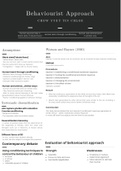Summary
Summary Behaviourist approach
- Institution
- WJEC
summary has included: 1. Assumptions -with all assumptions -using SEE method State, Explain and Example -helping you to remember less but important keywords and points to include in your exam 2. Therapy -three assumptions -with brief explanation to familiar self 3. Classic study -thi...
[Show more]



